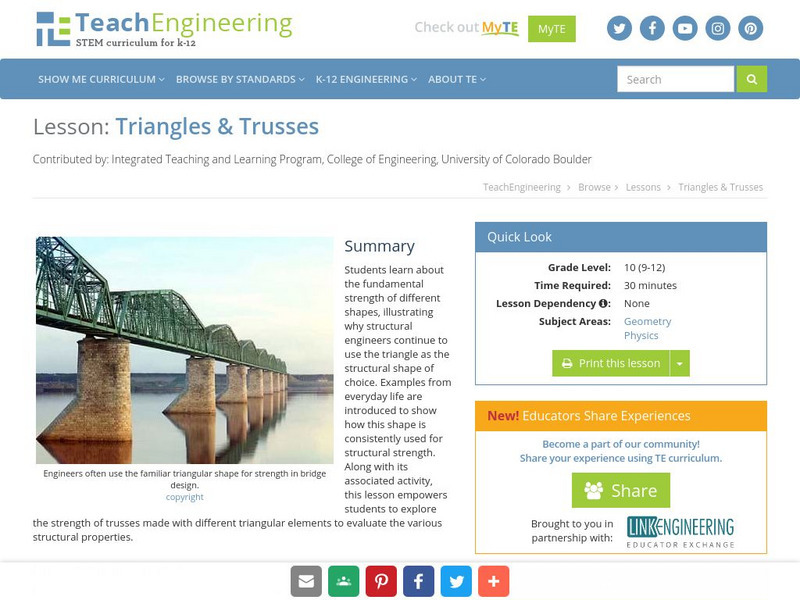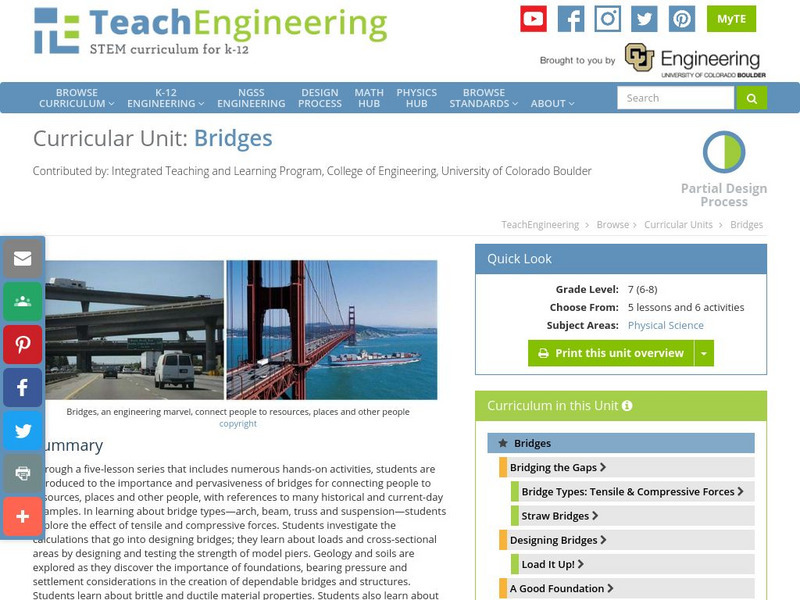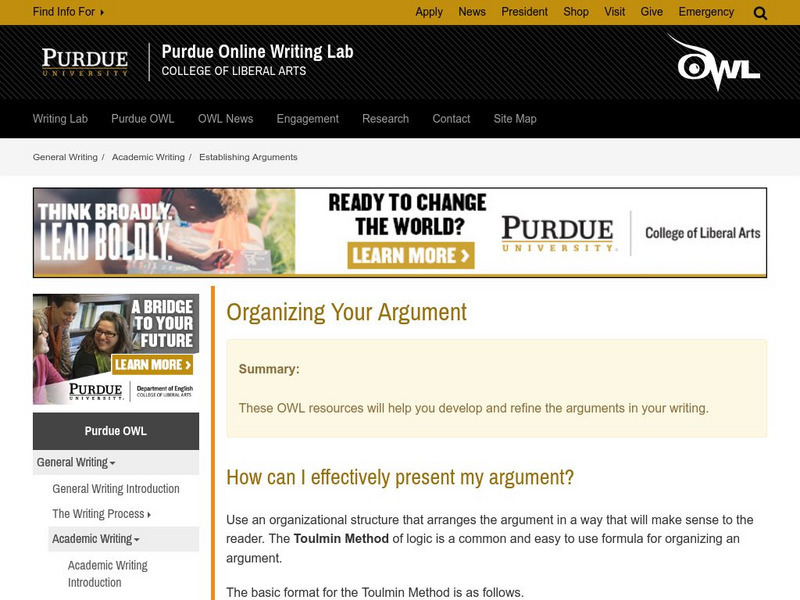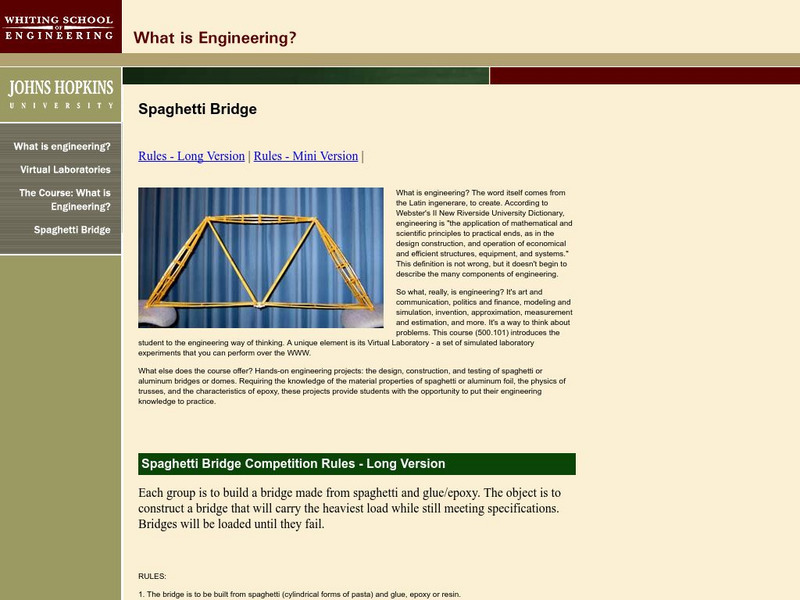TeachEngineering
Teach Engineering: Breaking the Mold
In this math activity, students conduct a strength test using modeling clay, creating their own stress vs. strain graphs, which they compare to typical steel and concrete graphs. They learn the difference between brittle and ductile...
TeachEngineering
Teach Engineering: Truss Destruction
Students work within constraints to construct model trusses and then test them to failure as a way to evaluate the relative strength of different truss configurations and construction styles. Each student group uses Popsicle sticks and...
TeachEngineering
Teach Engineering: Boom Construction
Student teams design their own booms (bridges) and engage in a friendly competition with other teams to test their designs. Each team strives to design a boom that is light, can hold a certain amount of weight, and is affordable to...
TeachEngineering
Teach Engineering: Building Our Bridge to Fun!
Students identify different bridge designs and construction materials used in modern day engineering. They work in construction teams to create paper bridges and spaghetti bridges based on existing bridge designs. Students progressively...
TeachEngineering
Teach Engineering: Triangles & Trusses
Students learn about the fundamental strength of different shapes, illustrating why structural engineers continue to use the triangle as the structural shape of choice. Examples from everyday life are introduced to show how this shape is...
TeachEngineering
Teach Engineering: Natural Frequency and Buildings
Students learn about frequency and period, particularly natural frequency using springs. They learn that the natural frequency of a system depends on two things: the stiffness and mass of the system. Students see how the natural...
TeachEngineering
Teach Engineering: Bridges
Through a five-lesson series that includes numerous hands-on activities, students are introduced to the importance and pervasiveness of bridges for connecting people to resources, places and other people, with references to many...
Online Writing Lab at Purdue University
Purdue University Owl: Organizing Your Argument
This Purdue University OWL (Online Writing Lab) explains how to organize information in an argumentative essay. Several examples are provided to show how each piece of evidence is elaborated.
PBS
Pbs Learning Media: Triangles: Designing a Straw Bridge
In this video segment adapted from ZOOM, the cast tries to design and build a bridge made out of drinking straws that will support the weight of 200 pennies. [4:02]
Library of Congress
Loc: America's Story: The Brooklyn Bridge
The history of the Brooklyn Bridge is an interesting story from our early days. Go to this site and learn who built it, how it was built, and many more facts. Some original pictures are included.
National Endowment for the Humanities
Neh: Edsit Ement: Xerxes' Bridges Over the Hellespont
Xerxes used hundreds of ships to create two bridges over the Hellespont. This interactive activity walks students through the stages of the construction.
Technology Student
Technology Student: Structures (Bridges and Towers)
Technology teacher V. Ryan provides access to more than three dozen illustrated articles and activities for learning about the design and building of bridges and towers.
PBS
Pbs: Nova: Super Bridge
Online companion to a NOVA program on bridges. Includes teacher resources, including a class activity through which students construct and test their own bridge,
Other
Bsi Education: Bridges and Tunnels
The Applied Science resource consists of practical activities that demonstrate the importance of standard procedures in scientific work. Students examine bridges and tunnels through a variety of activities.
Other
Whiting School of Engineering: Spaghetti Bridge
An engineering project where students construct a bridge from spaghetti and glue. Site includes guidelines, pictures, and movies of previous projects.
Other
Sprk: Sphero Bridge Stem Challenge [Pdf]
SPRK STEM challenges are fun, interactive activities that challenge students to use creativity and team-work to move through simple steps of the design process in order to build Sphero-based creations. In this challenge students will...
Other
University of Bristol: Tacoma Narrows Bridge Disaster
The Tacoma Narrows Bridge disaster was caused by wind vibrations. Wind in a valley spanned by the Tacoma Narrows Bridge causes the bridge to vibrate so much it collapsed. Shows pictures of the bridge as it is collapsing.
Other
Pay the Piper: The Cello
This website provides information on the cello for those students considering taking up a musical instrument. Includes information on playing, maintaining, and repairing the cello, and much more.
Cornell University
Cornell University: Cornell Center for Materials Research: The Physics of Bridges [Pdf]
Students incorporate their knowledge of civil engineering and physics principles as they design and build a bridge within certain parameters while choosing their own materials.
TeachEngineering
Teach Engineering: Cost Comparisons
Students learn about the many types of expenses associated with building a bridge. Working like engineers, they estimate the cost for materials for a bridge member of varying sizes. After making calculations, they graph their results to...
Physics Aviary
Physics Aviary: Suspension Bridge Lab
This lab is designed to have students look at how the forces needed to support a suspension bridge change as the object moves across the bridge. This lab is intended to be used as a companion to a live lab with similar equipment.
Tech4Learning
Pics4 Learning: Images for Education: Bridges
A large collection of beautiful photos of various bridges from around the world! A visual reference for teachers and students. Browse through the examples, then click to enlarge.
Technovation
Technovation Families (Formerly Curiosity Machine)
Technovation provides hands-on STEM activities. Students will watch an inspiring video about suspension bridges. Studentswill create their own bridge that must support at least 15 pennies.
University of Pennsylvania
University of Penn: Leonard Moss' "Arthur Miller"
As the title implies, this website from the University of Pennsylvania provides an excerpt from the preface of Moss' biography of Miller. The excerpt discusses Miller's position as a "social dramatist."
















![Cornell University: Cornell Center for Materials Research: The Physics of Bridges [Pdf] Lesson Plan Cornell University: Cornell Center for Materials Research: The Physics of Bridges [Pdf] Lesson Plan](https://content.lessonplanet.com/knovation/original/179288-156db1b103cd8a925bf41eafa438c1b7.jpg?1661496214)


